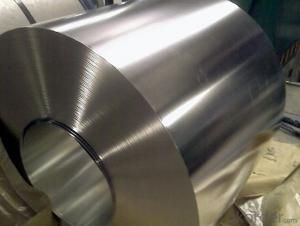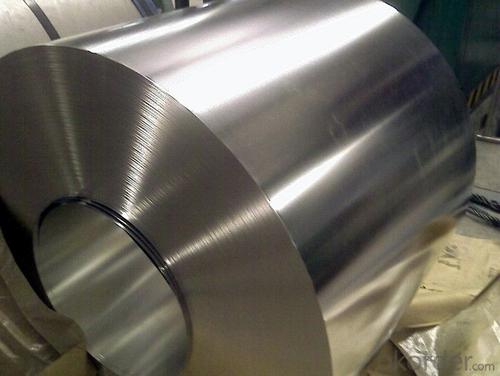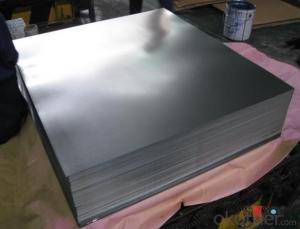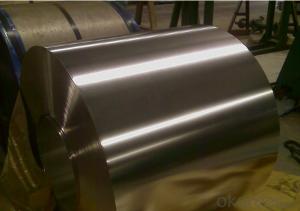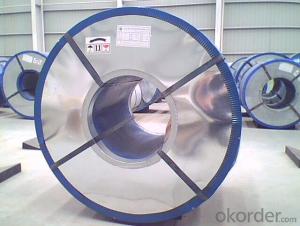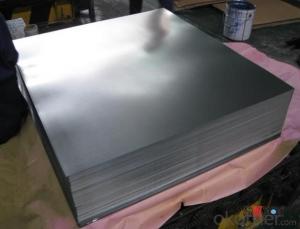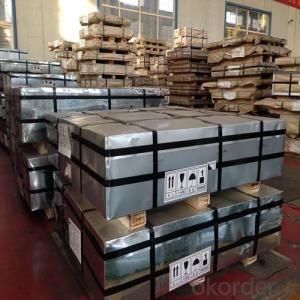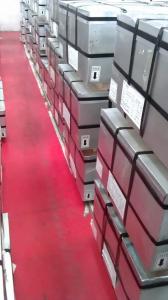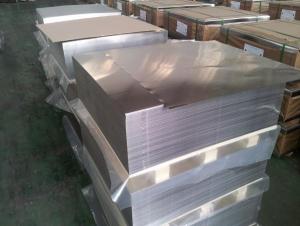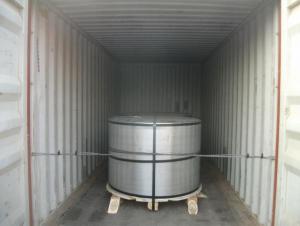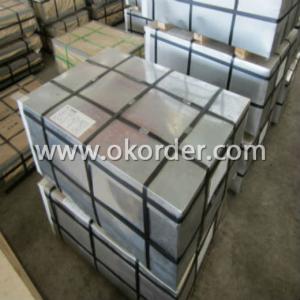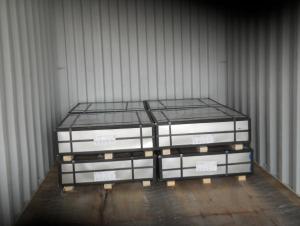Electrolytic Tinplate (ETP) for Foods and Chemical Packaging
- Loading Port:
- Tianjin
- Payment Terms:
- TT OR LC
- Min Order Qty:
- 25 m.t.
- Supply Capability:
- 20000 m.t./month
OKorder Service Pledge
OKorder Financial Service
You Might Also Like
1.Structure of Electrolytic Tinplate (ETP) for Foods and Chemical Packaging Description
Electrolytic Tin Plate Coils and Sheets for Foods Metal Packaging, is one thin steel sheet with a coating of tin applied by electrolytic deposition. Tinplate made by this process is essentially a sandwich in which the central core is strip steel. This core is cleaned in a pickling solution and then fed through tanks containing electrolyte, where tin is deposited on both sides. As the strip passes between high-frequency electric induction coils, it is heated so that the tin coating melts and flows to form a lustrous coat.
2.Main Features of the Electrolytic Tinplate (ETP) for Foods and Chemical Packaging
Appearance – Electrolytic Tin Plate is characterized by its beautiful metallic luster. Products with various kinds of surface roughness are produced by selecting the surface finish of the substrate steel sheet.
Paintability and printability – Electrolytic Tin Plates have excellent paintability and printability. Printing is beautifully finished using various lacquers and inks.
Formability and strength – Electrolytic Tin Plates have got very good formability and strength. By selecting a proper temper grade, appropriate formability is obtained for different applications as well as the required strength after forming.
Corrosion resistance – Tinplate has got good corrosion resistance. By selecting a proper coating weight, appropriate corrosion resistance is obtained against container contents. Coated items should meet 24 hour 5 % salt spray requirement.
Solderability and weldability – Electrolytic Tin Plates can be joined both by soldering or welding. These properties of tinplate are used for making various types of cans.
Hygienic – Tin coating provides good and non toxic barrier properties to protect food products from impurities, bacteria, moisture, light and odours.
Safe – Tinplate being low weight and high strength makes food cans easy to ship and transport.
Eco friendly – Tinplate offers 100 % recyclability.
Tin is not good for low temperature applications since it changes structure and loses adhesion when exposed to temperatures below – 40 deg C.
3.Electrolytic Tinplate (ETP) for Foods and Chemical Packaging Images
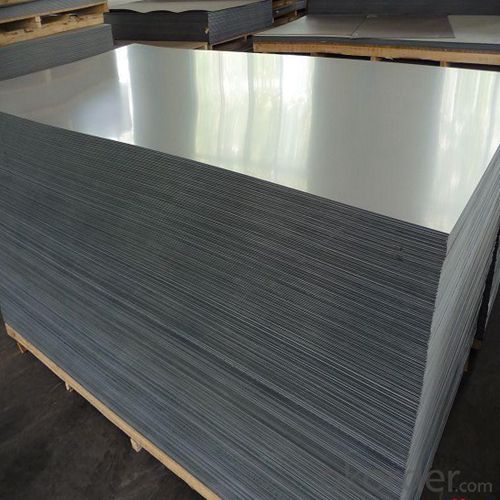
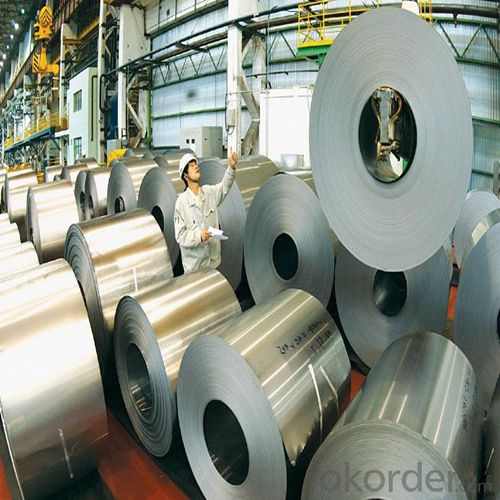
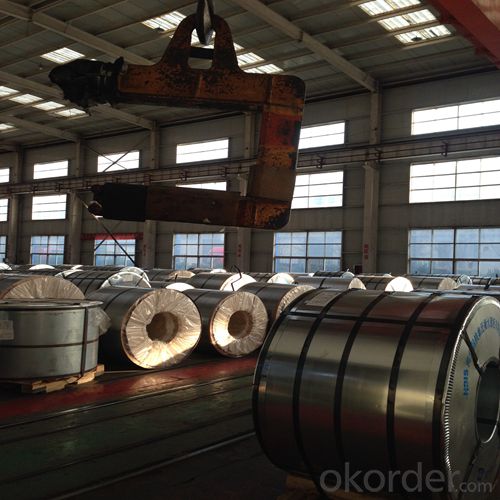
4.Electrolytic Tinplate (ETP) for Foods and Chemical Packaging Specification
Standard | ISO 11949 -1995, GB/T2520-2000,JIS G3303,ASTM A623, BS EN 10202
|
Material | MR,SPCC |
Thickness | 0.15mm - 0.50mm |
Width | 600mm -1150mm |
Temper | T1-T5 |
Annealing | BA & CA |
Coil Inner Diameter | 508mm |
Weight | 6-10 tons/coil 1~1.7 tons/sheets bundle |
Passivation | 311 |
Oil | DOS |
Surface | Finish,bright,stone,matte,silver |
5.FAQ of Electrolytic Tinplate (ETP) for Foods and Chemical Packaging
-How to place .an order or contact you ?
Please send us Email. we will give you a quick response in seconds .
- How is your quality ?
All our quality is prime even the secondary quality . We have many years experience
In this field with serious quality control standard . Advanced equipment, We welcome your visit to our factory .
- Q: What are the main differences between tinplate and tinplate laminates in terms of design flexibility?
- Tinplate offers limited design flexibility due to its rigid nature, whereas tinplate laminates provide greater design flexibility as they can be combined with other materials, such as plastic or paper, allowing for more intricate and varied designs.
- Q: What are the typical manufacturing processes for tinplate products?
- The typical manufacturing processes for tinplate products include coil cutting, cleaning and coating, pressing or stamping, forming or shaping, welding or soldering, and final finishing or packaging.
- Q: Tinplate also known as what? What is the density of it?
- This kind of galvanized steel in a long time Chinese called "tin", some people think that the tin plate when the manufacture cans from Macao (English Macao for tinplate imports, readable) so called "tin".There are other statements, such as China used this lamp tin plate made of kerosene, shaped like a horse, so called "tin".
- Q: What is the use of tinplate printing tin, storage of food safety
- Electrophoresis on a layer of special coating with food packaging, the packaging is extremely tight, in order to packaging material appearance, appearance are printed with various patterns, because it is the coating of food grade materials, so the food packaging is safe in the warranty period.
- Q: What are the different sizes and shapes of tinplate packaging available?
- Tinplate packaging comes in various sizes and shapes to cater to different product requirements. Some common sizes include rectangular tins, round tins, and square tins. These sizes can range from small, pocket-sized tins to larger ones suitable for bulk packaging. Additionally, tinplate packaging can also be customized to specific shapes and dimensions, allowing for unique and eye-catching designs.
- Q: What are the advantages of using tinplate for toys and games?
- One advantage of using tinplate for toys and games is its durability. Tinplate is a strong material that can withstand rough play and handling, making it ideal for toys that may be subjected to frequent use and potential impacts. Additionally, tinplate is resistant to corrosion, ensuring that the toys and games made from this material will last longer and maintain their quality. Furthermore, tinplate can be easily shaped and molded into various designs, allowing for the creation of intricate and detailed toys and games. Overall, the use of tinplate in the manufacturing of toys and games offers advantages in terms of durability, longevity, and design flexibility.
- Q: Can tinplate be used for furniture?
- Yes, tinplate can be used for certain types of furniture, particularly for creating decorative elements or accents. However, it is not commonly used as the primary material for furniture due to its relatively low strength and durability compared to other metals like steel or aluminum.
- Q: What are the different ways to customize tinplate packaging?
- There are several ways to customize tinplate packaging. Some common methods include printing or embossing designs or logos directly onto the tinplate, applying decals or labels, using different colors or finishes, adding metallic or matte effects, and incorporating additional elements like windows or handles. These customization options allow businesses to create unique and visually appealing tinplate packaging that aligns with their brand identity and stands out on the shelves.
- Q: How does tinplate contribute to the overall durability of packaging?
- Tinplate contributes to the overall durability of packaging by providing a strong and protective barrier against external factors such as moisture, oxygen, and light. Its corrosion-resistant properties ensure that the contents of the packaging remain fresh and intact for a longer period of time. Additionally, tinplate's strength allows for stacking and transportation without damage, ensuring the longevity of the packaging and extending the shelf life of the products inside.
- Q: How does tinplate contribute to the preservation of photographic equipment?
- Tinplate contributes to the preservation of photographic equipment by providing a durable and corrosion-resistant material for the construction of camera bodies, lens barrels, and other sensitive components. Its protective coating prevents the equipment from rusting or deteriorating over time, ensuring the longevity and functionality of the photographic devices.
Send your message to us
Electrolytic Tinplate (ETP) for Foods and Chemical Packaging
- Loading Port:
- Tianjin
- Payment Terms:
- TT OR LC
- Min Order Qty:
- 25 m.t.
- Supply Capability:
- 20000 m.t./month
OKorder Service Pledge
OKorder Financial Service
Similar products
Hot products
Hot Searches
Related keywords
